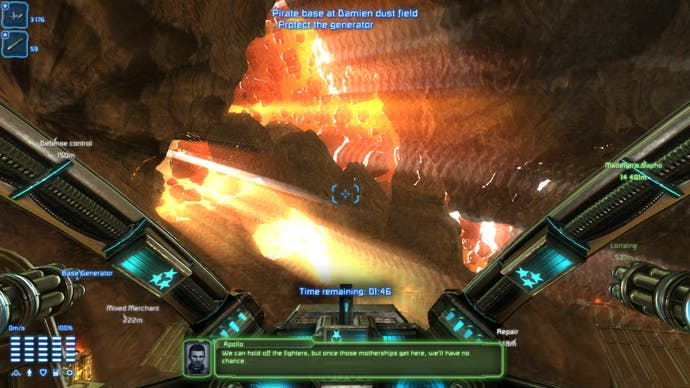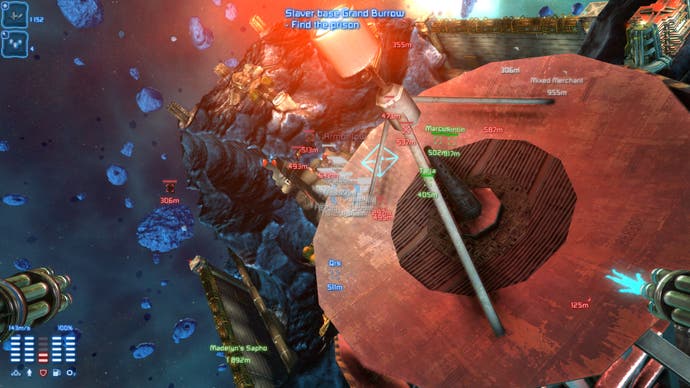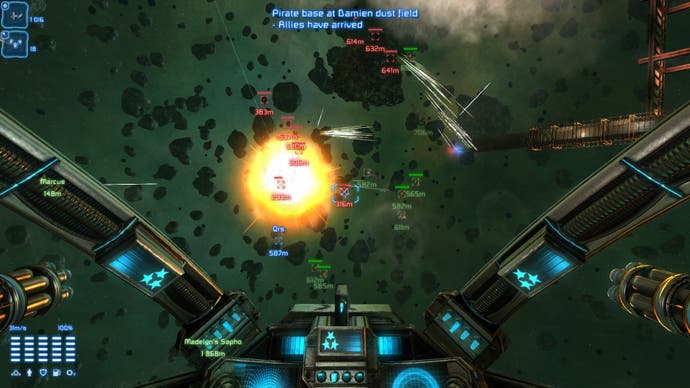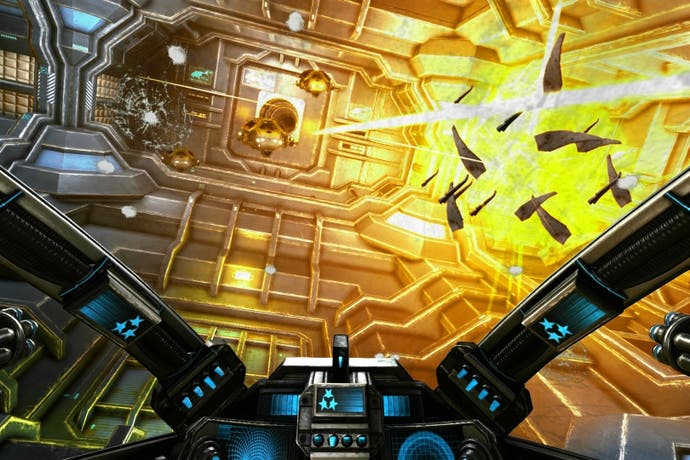Miner Wars 2081 review
Strike.
Right from the off, Miner Wars 2081 is confused. (It's confusing, too, but we'll get to that.) Trapped in the middle of a deep space mining facility under attack by the Russian armada, you're surrounded by HUD elements informing you that the surrounding asteroid walls are rich in minerals. It's the first thing you see - and it's immediately irrelevant. You're supposed to be escaping and instead you're being distracted with nitrogen nodules.
It's Miner Wars 2081's way of telling you that it didn't always want to be a linear, mission-based space combat game. It's full of hangovers and half-realised systems that were originally put in place to provide emergent stories for a sandbox space sim. The minerals are the most obvious leftover; you can mine and sell them, but you're never given the time to actually get your drill out and pull them from the rock face. Instead, there's always something else tugging at your attention or a timer ticking down with petulant urgency.
The real selling point for Miner Wars was always going to be the procedurally destructible environment. Space is littered with the remnants of what was once Earth - huge asteroids that occupy a field that stretches out as far as the eye can see. The sun went nuclear, apparently, and it caused both Earth and Mars to explode. The vast majority of the pieces of world that you can see can be blown up or mined if you have enough explosives.

In theory, that's a brilliant way to inject some more life and excitement into space combat, a genre that often suffers from its complete lack of interesting geometry. But in reality, due to the way Miner Wars handles, it's relegated to the role of set-dressing: a nice little diversion once you're done with the fighting and you spot a few craters from your missiles. It's never something you can wrangle into a tactical advantage and there's no flanking by hewing a path out of the world around you, Red Faction-style.
Again, it feels like a feature that would sit better in a more open game design. There is a sandbox mode hidden away in Miner Wars 2081's multiplayer, but it's beyond bare bones. It feels more like an alpha test than a fully-fledged game mode - a temporary diversion and nothing more. Miner Wars, for better or worse, boils down entirely to its campaign.
By and large, it's for worse. These disappointments could have fallen by the wayside if the meat of the combat and missions had been worth savouring. But they feel rushed at best. A lacklustre story frames engagements that leave you hovering in space, trading blows with stationary enemies, rather than engaging in tense displays of zero-G ballet.
Inertial dampers put prevent you revelling in Newtonian physics; it feels like you're controlling a first-person shooter character in no-clip mode rather than a weighty space fighter. Worse, there are random difficulty spikes in the middle of fights, such as when you suddenly find yourself the target of a turret that chews through your armour before you even realise you're under attack. When the typical fighter will barely scratch the paintwork, it's an insane contrast, and the battle devolves into popping in and out of view of the turret to let off missiles. It just feels silly.

Even with all these problems, Miner Wars 2081 could have been saved by a robust multiplayer mode that attempted to realise the potential of a destructible arena. The only problem is that, at the time of writing, there are no multiplayer servers and no-one is hosting their own. The best you can do is barge in on someone else's single-player game for a spot of co-op.
Even this could have elevated the campaign into an enjoyable romp with a friend, but the netcode is all over the place. Eventually, lag problems and a weird bug where enemy ships wouldn't disappear after dying scared me off for good. It's an endemic problem throughout Miner Wars: ambitious ideas that don't even come close to being properly executed.
Fundamentally, that's what defines Miner Wars 2081, and it's what seems to have defined the game's development, too. Everything from the map to the lore to tertiary systems like trading and mining hint at an open-world, exploratory space sim, but clearly something happened to force Keen Software House into curtailing its ambition and focusing instead on creating a more tailored, single-player experience.
It's occasionally beautiful to look at, which makes it doubly sad when it creaks and lurches. There are reports that it runs abysmally on anything that isn't a monster of a PC, and while the game didn't have any frame-rate problems in my experience, it did immediately crash when I tried to load up the level editor, and hung a few times during loading screens.

At first glance, Miner Wars 2081 positions itself somewhere between Descent and Freelancer, two of the finest examples of spaceflight games. In fact, it has torn itself apart trying to be both while getting nowhere close to either. The developers seem keen to continue iterating and developing, so perhaps in a year or two that will be a completely different story - but as things stand, it's hard not to call Miner Wars 2081 anything but a failure.
The systems that should have been its biggest draws are relegated to one-trick sideshows, while the majority of the game is just one dreary combat engagement after another. There's a story, but it loses itself in alien-artefact cliché almost immediately before peppering each encounter with caricatured regional accents and inexplicable pirates who actually speak like cartoon pirates.
Miner Wars 2081 was one of the first games to be greenlit on Steam, and it's easy to see why; it was selling everything that space sim fans were looking for. But every single one of those sales pitches has fallen short, and what we're left with is something that only resembles its initial promise in passing.

